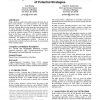7504 search results - page 31 / 1501 » Computing with Action Potentials |
126
click to vote
DIGRA
2005
Springer
15 years 8 months ago
2005
Springer
Trans-reality role-playing games are conceived of as a form of role-playing game evolving from and integrating established table-top, live-action and computer-based role-playing f...
147
Voted
GROUP
2005
ACM
15 years 8 months ago
2005
ACM
People search for people with suitable expertise all of the time in their social networks – to answer questions or provide help. Recently, efforts have been made to augment this...
145
click to vote
MCS
2011
Springer
14 years 9 months ago
2011
Springer
: When working with large-scale models or numerous small models, there can be a temptation to rely on default settings in proprietary software to derive solutions to the model. In ...
107
click to vote
AIIDE
2008
15 years 4 months ago
2008
We introduce the ALeRT (Action-dependent Learning Rates with Trends) algorithm that makes two modifications to the learning rate and one change to the exploration rate of traditio...
AAAI
2007
15 years 4 months ago
2007

